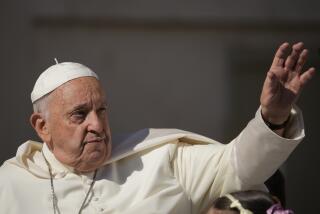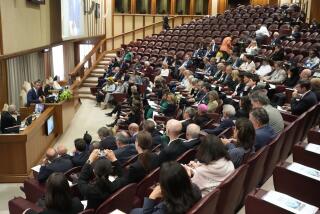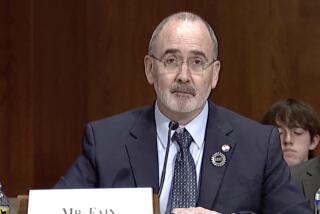Viewpoints : The Pope Talks Business : While Modernization May Be Inevitable, Workers Deserve Aid
- Share via
After spending 10 days in the United States and giving some 50 addresses, Pope John Paul II said very little directly to the American business community. But what little he did say carries an important message for business people and economic policy-makers in the United States.
In downtown Detroit, in the midst of impressive high-rises, the Pope spoke compassionate words to the thousands of workers who have been displaced as the automotive industry has modernized. He said “modern technological developments” such as the use of robotics may be the cause of injustice. And yet the Pope did not condemn automation and modernization. Significantly, he acknowledged that some of this modernization is inevitable and necessary.
To the Pope, the injustice that can arise out of automation and modernization lies not strictly in the loss of jobs as factories and offices are made more productive and efficient but in the fact that workers may be laid off without being given new opportunities to use their skills and talents. The open attitude toward modernization rests in church doctrine that calls upon people to use ingenuity and creativity to make the workplace more humane; a natural outgrowth of that is to design work more efficiently.
The Pope has dealt with these issues before and in much greater depth, notably in his 1981 encyclical, Laborem Exercens (On Human Work). In that statement of social concerns, there is a recognition that our current dynamic economy will often require job retraining. There is a corollary recognition that Third World developing countries must gain a greater share of world markets, even if in the short run the price is a somewhat lower standard of living in developed nations such as the United States, Canada and Europe.
Where does this lead us? To the message that people are primary. That making money or creating efficiencies in business are not ends in themselves. That creating the conditions for a humane life for all people should be our goal--a life where people can achieve an adequate material standard of living, where there are opportunities to do work that is fulfilling and where people can help shape their work and work environment.
The issues raised by the Pope have become more compelling because they come at a time of widespread protectionist sentiment in this country and in other developed nations where many workers fear they will lose their jobs to low-wage Third World nations.
Where there are inevitable job displacements, the Pope is saying, society must ease the transition, doing whatever it takes to restore a healthy and productive person.
But the major theme of the Pope’s address at Detroit’s Hart Plaza was that these contemporary social problems must be viewed in a global context, not from the standpoint of what is good solely for one nation or region or one set of workers. Economic decisions of this country “must be considered within the context of worldwide repercussions,” the Pope said. In sum, we must keep in mind the welfare of all people, wherever they may live and work. We must improve the lot of all people, not just our own.
This perspective stands in marked contrast with a 1982 statement on the economy of the Canadian Catholic Bishops--a document that was quite specific in offering solutions for that nation’s economy, arguing for more production of textiles for domestic use, for example.
No Specific Recommendations
Analysts have noted that such a recommendation would require either lower wages for Canadian workers so they can compete against imports from developing countries or protective tariffs against the cheaper imports to keep Canadians employed. Presumably, the Canadian bishops were not advocating lower wages for Canadian workers; the likely alternative of tariffs would take jobs from workers in developing nations.
This problem of how various markets, nations and workers are linked together, influenced by each other, seems to have eluded the Canadian bishops. But it is clearly central to the Pope’s thinking.
Among some U.S. Catholic leaders, there is concern that the Pope did not even mention the document of the U.S. bishops on the economy issued in November, 1986--a document that emphasized the needs of the poor, the underclass, the hard-to-employ, and sought to assure that they had access to a humane life of health care, education opportunities and jobs.
While the major themes of the U.S. bishops’ statement were reiterated, there was no direct reference to the document itself. Much of the Pope’s discussion was on the level of general principle and moral vision. There were no specific policy recommendations.
To be sure, the concern for the poor and less fortunate was evident throughout the Pope’s visit, not only in what he said, but by the sorts of people who occupied his time. Migrant workers, the unemployed, blacks, Latinos and AIDS victims all received special attention.
What differentiates papal teaching from the U.S. bishops’ letter on the economy, however, is that the U.S. document goes beyond principles and a moral vision of Catholic social teaching and offers specific applications of the principles in the form of policy recommendations.
Moral Principles Are Key
For example, the U.S. bishops’ letter recommends federally funded job-creation programs. The logic of this proposed remedy for unemployment has been roundly criticized by editorial writers at some major U.S. newspapers. The Wall Street Journal described it as “simply poor policy.”
The U.S. bishops, in writing their letter on the economy, noted that policy recommendations to reform the economy involve differing judgments by people of good will, and hence are not as compelling as moral principles.
Nevertheless, the bishops decided to include some specific policy suggestions in hopes that these would at least indicate a direction and perhaps stimulate debate on what a more humane economy might entail. That the Pope never once mentioned the U.S. bishops’ letter, “Economic Justice for All,” may become a matter of continuing discussion. Whether it means he disagrees with this approach for the teaching church, whether he disagrees with the substance of the policy recommendations or just didn’t want to enter the debate is a matter of great conjecture at this point.
Only the Pope himself can clarify the confusion on that issue. But the Pope’s overall message for business and the economy in his visit to the United States was clear: We must design policies that promote the welfare of all the world’s people. And as the world economy endures enormous change, we must create opportunities for workers who are affected by change to move on to other pursuits that allow for their economic well-being and personal fulfillment.
More to Read
Inside the business of entertainment
The Wide Shot brings you news, analysis and insights on everything from streaming wars to production — and what it all means for the future.
You may occasionally receive promotional content from the Los Angeles Times.










